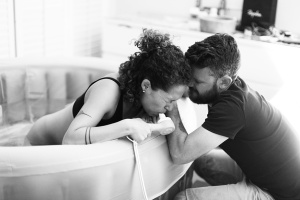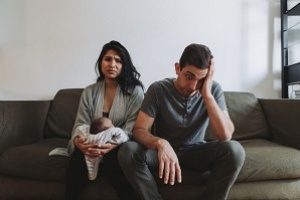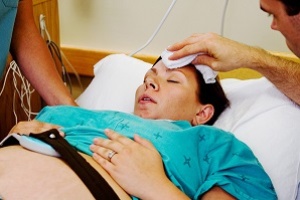We speak to Kim Thomas, CEO of The Birth Trauma Association, to find out about Birth Trauma Awareness Week and the support for parents after having a difficult birth.
What is Birth Trauma Awareness Week about?
Our first Birth Trauma Awareness Week was in 2017 and it has a few aims. One is simply to make more people aware of the condition. Many people, even healthcare professionals, aren’t aware that it’s possible to experience post-traumatic stress disorder (PTSD) after birth. The week is a good way of raising awareness.
It also provides an opportunity for women to share their stories and bring the topic out into the open. This is important for many women who feel that they’re expected to keep quiet about their experience.
We like to use the week to highlight a particular aspect of birth trauma. Many women who have had a traumatic birth find it affects relationships with their partner, family, friends and healthcare professionals.
Is birth trauma more likely to happen to some women or during certain types of birth?
We know that sexual assault victims are more susceptible to birth trauma because the experience of giving birth can re-awaken memories of the assault. That aside, most women who experience birth trauma have no particular background that predisposes them to the condition. It can happen to women of any age, ethnicity or social class.
When it comes to the type of birth, we find that very long labours, or very short intense ones are more likely to lead to birth trauma. We also frequently see women who have had an emergency caesarean birth, forceps birth or a postpartum haemorrhage.
The thing that women are most likely to mention when talking about the trauma, however – aside from the traumatic event itself – is how they were treated during labour. If they feel that staff talked down to them, or didn’t listen to them, or failed to explain what was happening, that can be a major contributor to post-traumatic stress disorder (PTSD).
How would someone know if they were suffering from birth trauma? How is it different to PND, for instance?
It can be quite hard to know the difference. We find that GPs and health visitors can sometimes get it wrong. PTSD is characterised by four main symptoms (though not everyone experiences all four):
- Re-imagining the trauma through flashbacks or nightmares.
- Hyper-arousal, which is a sense of being alert all the time. This includes feeling frightened that you or your baby are going to come to harm.
- Avoiding anything that reminds you of the trauma, e.g. other women with babies, programmes such as One Born Every Minute or hospital clinics.
- Negative cognition, which is a mix of things, such as feeling guilty. This is very common among women who have had traumatic births. They are sometimes unable to remember parts of the traumatic event, and sometimes simply feel low.
Women with postnatal depression (PND) don’t tend to have the symptoms of flashbacks and avoidance. They do experience low mood and might feel anxious. They also tend to lack energy and not feel interested in life.
Both women with PTSD and those with PND might find it harder to bond with their baby. There is also an overlap - an estimated half of women with postnatal PTSD will experience PND symptoms as well.
What should someone do if they think they’ve experienced birth trauma?
The best thing you can do if you think you have birth trauma is to go to your GP and ask for a referral to a therapist. Ask for a therapist who specialises in either trauma-focused cognitive behavioural therapy (CBT) or eye movement desensitisation and reprocessing (EMDR). Both are intense therapies that achieve very good results. We’ve seen women make amazing recoveries.
If you’re in England, you can also self-refer through the Improving Access to Psychological Therapies (IAPT) service. (If it helps, you could take a copy of our leaflet to your appointment with your GP.)
We’d also encourage women to join our private Facebook group for peer support. We now have nearly 8,000 members. It’s a great way of being able to share your story with other people who know what you’re going through.
How can dads/partners support their partners?
The most important thing is to listen. So many women tell us that their partners and family members urge them to stop dwelling on the trauma, or to be grateful that they have a healthy baby. This doesn’t help because PTSD isn’t something you have conscious control over; any more than you can consciously decide not to have a broken leg or appendicitis.
Just listening without judgement is helpful. Many women with PTSD can become tense, irritable and over-protective of their baby. It can be hard for partners to live with that, especially while already coping with the stress of a new baby. So the other thing you can do is to encourage them to seek help. Women are often reluctant to ask for professional help but if they want to recover, it’s the best thing they can do.
How can dads/partners seek support for themselves if they need it?
It can be tough for dads and female partners. Some partners develop PTSD as the result of seeing a traumatic birth; perhaps fearing that their partner or baby was going to die. For other partners, it’s just hard to live with someone experiencing PTSD.
If you think you might have PTSD as the result of being present at a traumatic birth, it’s a good idea to seek therapy. Ask your GP for referral to an EMDR or trauma-focused CBT therapist.
If you’re looking for support from other fathers, Dr Andrew Mayers, of Bournemouth University has a page with some useful resources. Both dads and female partners are also welcome to join our Facebook group.
The Birth Trauma Association (BTA) is charity that supports women who are suffering from birth trauma. The website has lots of information, parent case studies and support.
Further information
Our support line offers practical and emotional support with feeding your baby and general enquiries for parents, members and volunteers: 0300 330 0700.
Make friends with other parents-to-be and new parents in your local area for support and friendship by seeing what NCT activities are happening nearby.








